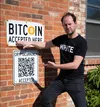“In a world where everything can be copied, the real thing becomes the most dangerous currency.”
I. The Illusion of Profiles
Humans, once bound to bodies and voices, have long since dissolved into pixels. We appear as abbreviations, avatars, and handles. Our faces, once mirrors of the soul, are now .jpgs in Telegram groups. And can be copied with a click. Robin, 32, Hamburg, Bitcoiner, is no exception.
He posts an ad, like others: Sats for euros. Only this time, the market isn't just any exchange, but Satoshi Kleinanzeigen, a sort of telegram craigslist for bitcoiners. The handshake is a click, the voice a text, the trust a picture of his ID.
And it's precisely this image that's being stolen from him. Not by force, but by trust.
A buyer named "Ralf Schumacher"—as if taken from a real-life satire—requests verification before buying sats from him. Robin sends his ID. Shortly thereafter, his chat is deleted. A new profile is created—with his name, his picture, his document. But behind it, someone else is operating. Someone who collects vouchers, accepts bank transfers, and delivers nothing. And makes people like "Flo" into victims.
II. Trust in a world without bodies
What is identity when it's just a few pixels? What is trust when it's no longer based on presence, but on screenshots?
We live in a world where verification is becoming increasingly difficult and, at the same time, increasingly important. Humans, as social beings, want to believe—and for this very reason, we are repeatedly deceived. In digital spaces, trust becomes a paradoxical risk: the more open you are, the easier you are to copy.
Robin is a case in point. He did nothing wrong – and yet everything was done wrong. The Telegram group in which he once posted blocked him without a hearing. The community judged him without context. The state? Is routinely filing a complaint. Will anything change? Doubtful.
III. The three levels of fraud
In Robin’s case, we encounter three levels of deception:
- Identity fraud : The "buyer," Ralf, steals Robin's ID card—not to buy, but to steal. Identity as a commodity.
- The structural fraud : The platforms that are supposed to build trust (Telegram, classified ads) offer no protection. They are tools – blind, deaf, neutral. The structure is open, but vulnerable.
- The social deception : The group that actually wants to be a community becomes a lynching stage. The real Robin is cast out—not because he is guilty, but because appearances are sufficient.
IV. The State as a Phantom Helper
A watchful eye recognizes the state not as a saving grace, but as a system that either reacts too late – or regulates too early. Robin's complaint is accepted, but what will be the outcome?
The perpetrators operate pseudonymously, transnationally, and under the protection of asymmetric communication channels. Their trail is lost in the fog of digital anonymity. The police have little power to act, so they react with the only weapon at their disposal: expanding control, tightening KYC, and threatening regulation. But the goal is missed.
Because it is not the technology that is evil, but the uninformed application.
V. Bitcoin as a mirror of responsibility
„Don’t trust. Verify.“
– Satoshi
Bitcoin is not a tool for fraudsters—on the contrary: it is an instrument of truth. Every block, every transaction is proof. Immutable, transparent, mathematically secured. But what Bitcoin doesn't protect is people—their trust, their identity, their decisions.
This reveals a paradoxical truth: Bitcoin is radically neutral. Those who don't protect themselves won't be protected.
That's why Bitcoin isn't just money—it's a mirror. It shows you how serious you are. Whether you're planning ahead. Whether you're learning. Or whether you're blindly trusting because it's easier.
VI. Privacy as a new virtue
In a society that forces you to constantly reveal yourself – with ID, with selfies, with video identification – the desire for privacy is not paranoia, but self-respect.
Best practices for P2P Bitcoin transactions:
- Don't send IDs. Never. Not even for "verification." Anyone who wants Bitcoin should understand Bitcoin—and that means trading pseudonymously and peer-to-peer.
- Use privacy tools:
- Robosats (Tor-based, no-KYC, escrow)
- Bisq (decentralized trading platform with fiat bridges)
- Use CoinJoin & Whirlpool.
- Remix regularly
- Avoid address recycling
- Use cold storage
- Prefer Lightning.
- Faster, cheaper, harder to analyze
- Ideal for smaller P2P purchases
- Use your own node or mobile wallets with privacy mode
- Build communities, not just groups.
- Reputation counts more than verification.
- Local Bitcoin get-togethers, Nostr connections, real encounters.
VII. Who protects whom?
The key question remains: Who protects you?
- The state? Only on paper.
- The platform? Only against itself.
- The group? Only as long as you're part of it.
In the end, the only thing that protects you is your knowledge, your preparation, your system.
Robin could have known.
But should he have known ?
Or is the real lesson that everyone has to learn—through mistakes, losses, and friction?
VIII. The return to sovereignty
“Privacy is not a technology. It is an attitude.”
– Edward Snowden
In the libertarian view, humans are not petitioners of the state, but sovereign beings who voluntarily cooperate. Trust is voluntary. Control is force.
If we take Bitcoin seriously as freedom money, we must also take its social conditions seriously: Distrust is not a weakness, but a protective reflex. Anonymity is not a camouflage, but a refuge. And privacy is not an option, but a survival strategy.
IX. The “Flo” case – a reflection of weaknesses
Flo is the second victim in this story. He sent money but received no service. But here, too, it wasn't just the fraudster who was the problem—it was the lack of a system of checks, reputations, and protection mechanisms. Proof that Bitcoin isn't "safe"—if you use it like PayPal.
Bitcoin only works well if you understand how it is designed.
X. Lesson for the future
“In a world without trust, we must build systems that make trust unnecessary.”
– Nick Szabo
That means:
- Education instead of bureaucracy
- Reputation instead of regulation
- Personal responsibility instead of prosecution
Only in this way can a culture emerge in which Robin does not become both a victim and a scapegoat, but rather someone who makes the community wiser through his mistake.
XI. Bitcoin as a social operating system
Bitcoin is more than money. It is a protocol for truth without trust, exchange without intermediaries, and freedom without permission.
But these ideals only work if we live them – that is, if we internalize and live "don't trust, verify."
XII. No-KYC or no Bitcoin
In the end, it all leads to a simple conclusion: Anyone who buys Bitcoin under KYC rules is not playing with the cards on the table – but with a bullet to their head.
Any compulsion to identify weakens the individual. Every ID upload is a bargaining chip you can never get back. The future of Bitcoin should not be fully regulated, but radically free—as the protocol allows.
XIII. The Price of Sovereignty
Robin paid—not with money, but with trust. His story is not an isolated case, but an archetype.
In a world where identity becomes a target of attack, our only option is to return to the invisible. Humans must relearn how to go unrecognized —not out of fear, but out of principle.
Because only he who protects himself is free.
„Don’t send IDs. Don’t trust Telegram profiles. Don’t expose your name for 2000 Euro. Your pseudonym is your shield. Keep it on.“
— Sinautoshi

Sinautoshi
#Bitcoin only - #GetOnZero - united we fix the money (supply to 21M BTC)




Related Posts
Mixing with Whirlpool
Oct 03, 2022